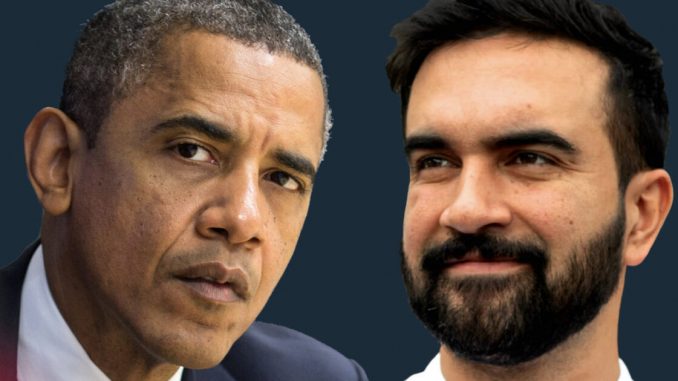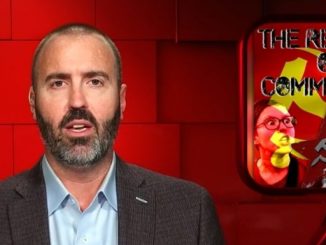
| Published July 7, 2025
In the evolving landscape of American politics, a quiet but unmistakable transformation is taking place. What once operated discreetly behind polished rhetoric and centrist messaging is now stepping into the spotlight, unapologetic and emboldened. This shift—from subtle, incremental advocacy of leftist ideas to bold, open declarations of socialist goals—is reshaping public discourse and political identities.
A key figure in the earlier phase of this transformation was a former U.S. president whose policies, though often presented as moderate or pragmatic, bore the hallmarks of redistributionist thought. Critics noted that during his tenure, traditional American ideals of free enterprise and limited government were increasingly challenged by an expanded federal footprint, from healthcare mandates to regulatory overreach. He navigated political culture with charm and moderation, yet his policy legacy signaled a philosophical shift—one that quietly redefined the acceptable boundaries of state intervention.
Today, the quiet has been replaced with clarity. Leaders of a new generation aren’t hiding their intentions—they’re declaring them. Among them stands a state legislator from New York City whose political vision offers a window into the left’s next phase. His message is loud and clear: abolish billionaires, freeze rents, make subways free, and replace private stores with city-run alternatives. He’s not just pushing policies; he’s challenging the very structure of American capitalism.
What sets this approach apart is its transparency. There’s no attempt to temper language for mainstream appeal. Phrases like “no one should be a billionaire” are spoken not in hushed tones, but from podiums and on campaign trails. The call for wealth redistribution isn’t softened—it’s a centerpiece. Even controversial positions, such as defunding the police or supporting boycotts against foreign allies, are presented as moral imperatives rather than fringe notions.
This unapologetic rhetoric marks a break from the strategic subtlety of earlier progressives. While past figures worked through the existing system—expanding social programs, nudging tax policy, and embedding ideological allies into the bureaucracy—today’s new wave is focused on reimagining the system altogether. They frame their movement not as a policy adjustment, but as a moral revolution.
The cultural shift is also significant. This new politics embraces identities, narratives, and academic theories that challenge long-standing American norms. The messaging is globalist, anti-imperialist, and rooted in critical theory. It often questions the legitimacy of U.S. allies and American exceptionalism itself.
Whether one sees this as a long-overdue reckoning or a radical overcorrection, the implications are profound. The conversation has moved from “How can we improve capitalism?” to “Should capitalism exist at all?” The old left whispered; the new left shouts.
For many Americans, this transition represents a new political reality. It forces a reckoning—not just with policy differences—but with fundamental ideas about governance, economics, and national identity. The era of stealth is over. The era of open socialism has begun.
WATCH:
 Resulting Effects: A Nation Responds to the Open Embrace of Socialism
Resulting Effects: A Nation Responds to the Open Embrace of Socialism
The transition from subtle policy maneuvers to overt socialist advocacy hasn’t gone unnoticed—or unanswered. As open socialism gains traction among a growing segment of younger, urban voters, the resulting effects are rippling through America’s political, economic, and cultural fabric.
🔹 1. Political Polarization Intensifies
The open call for dismantling capitalist structures has deepened the ideological divide. Traditional liberals now find themselves caught between defending market-based reforms and distancing themselves from radical demands within their own political coalition. Meanwhile, conservatives are mobilizing with renewed urgency, framing the socialist wave as an existential threat to the American system. The result is a more volatile, confrontational political climate, where compromise seems increasingly elusive.
🔹 2. Middle-Class Anxiety and Economic Uncertainty
As rhetoric shifts from reform to revolution, many working- and middle-class Americans express growing unease. Calls to abolish billionaires and nationalize sectors like housing and grocery retail may resonate with some, but others—especially small business owners and middle-income earners—fear being caught in the crosshairs of aggressive redistributive policies. The sense that “success might be punished” is gaining ground among voters who traditionally leaned centrist or left-of-center.
🔹 3. Realignment of Party Bases
The Democratic Party, long a coalition of moderates, progressives, and identity-focused movements, is experiencing internal strain. More centrist factions are being pushed aside or labeled as out-of-touch, while hard-left voices dominate online discourse and youth activism. At the same time, the Republican base is expanding to include disaffected independents and former moderates who feel alienated by the direction of the progressive left.
🔹 4. Cultural Institutions Under Pressure
The cultural consequences are just as sweeping. Academia, media, and public education are increasingly scrutinized for echoing themes of anti-capitalism, critical race theory, and decolonization. For supporters, these institutions are tools for enlightenment and change. For opponents, they’ve become engines of ideological indoctrination. This has triggered battles over school curricula, corporate training programs, and public broadcasting content.
🔹 5. Investor Skepticism and Business Flight
Major urban centers governed by open-socialist leaders are beginning to feel economic pressure. Policies like commercial rent control, business taxes on the wealthy, and the threat of public takeover proposals have sent warning signals to investors. In cities like New York and San Francisco, some corporations and entrepreneurs are relocating to more business-friendly states, accelerating what some call a “capital flight.”
🔹 6. Youth Enthusiasm and Movement Building
Despite backlash, one cannot ignore the momentum among younger generations. Open socialism has given voice to their frustrations—about student debt, unaffordable housing, wage stagnation, and perceived systemic injustice. Many see the movement as a moral crusade, not merely a political option. Grassroots organizing, social media outreach, and union-backed campaigns are flourishing in this environment.
🔹 7. Global Implications
International observers are watching closely. America’s shift is influencing left-wing movements abroad, just as it is alarming allies who rely on a stable, market-driven United States. Diplomatic relationships—particularly with Israel and other traditional allies—are being tested by the rise of leaders sympathetic to boycotts and global redistribution policies.
 Bottom Line: The Urgency of Reaffirming American Principles
Bottom Line: The Urgency of Reaffirming American Principles
What we’re witnessing isn’t just another political cycle—it’s an ideological battle over the soul of the nation. The open embrace of socialism—once unthinkable in mainstream American discourse—is now being sold as compassionate, forward-thinking, and inevitable. But beneath the slogans lies a dangerous rejection of the very foundations that made America prosperous: free markets, individual responsibility, private property, and limited government.
This isn’t about helping the poor or expanding opportunity—that can and should be done within a framework of liberty and enterprise. What’s being promoted today is a system where the state grows ever larger, the individual is subordinate to the collective, and the successful are punished simply for their achievements.
We’ve seen how this movie ends. Nations that chose this path—whether through gradual encroachment or revolutionary fervor—paid dearly: economic collapse, mass exodus of talent, suppression of dissent, and the eventual erosion of rights. Socialism may start with idealism, but it always ends with control.
Now is not the time for passivity. Now is the time to draw a line. Americans who believe in freedom, accountability, and opportunity must speak up, organize, and vote with clarity. If the choice is between flawed freedom and polished tyranny, we must always choose freedom—no matter how messy or imperfect it may be.
The shift from stealth socialism to open socialism is a warning shot, not a passing trend. The question now is whether America still has the will to defend what it once knew to be true: that liberty, not government, is the surest path to justice, prosperity, and human dignity.
SOURCE: THE GATEWAY PUNDIT – Barack Obama and Zohran Mamdani: From Stealth Socialism to Open Socialism





Be the first to comment